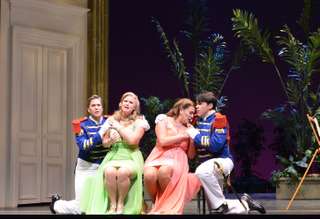|
Back
Your first time will be memorable Miami
Adrienne Arsht Center for the Performing Arts
01/24/2015 - & January 25*, 27, 30, 31 (Miami), February 12, 14 (Fort Lauderdale), 2015
Wolfgang Amadeus Mozart: Così fan tutte, K. 588
Hailey Clark (Fiordiligi), Carla Jablonski (Dorabella), Daniel Bates (Ferrando), Isaac Bray (Guglielmo), Arthur Woodley (Don Alfonso), Rebecca Henriques (Despina)
Florida Grand Opera Orchestra and Chorus, Brett Karlin (chorus master), Ramón Tebar (conductor)
Bernard Uzan (director), Riccardo Hernandez (scenic design), Howard Tsvi Kaplan (costume design), Donald E. Thomas (lighting design)

I. Bray, H. Clark, C. Jablonski, D. Bates (© Lorne Grandison)
Unquestionably Così fan tutte, a “problem opera,” is not for everyone. And in an era when the craft of subtlety is disappearing at the speed of light, it is not going to be easy to find newcomers who appreciate this masterpiece. But if you can’t warm to it right away, don’t give up because the rewards are endless. The problem is more us than the opera.
Of course, in order to get that far you need a solid cast, a conductor who can create beauty and humor and especially a director who understands human nature. This is not an easy bill to fill.
There will always be those who regard Così fan tutte’s libretto as weak; others cheer it as sophisticated satire. If there is anything wrong, perhaps it is that it is overstuffed. There is just too much music; too much great music. It is almost impossible to grasp the entire work with just one exposure. You might enjoy yourself very much; but only someone superhuman can completely digest a meal this huge in only three hours (and don’t forget, there are usually a significant number of cuts).
Florida Grand Opera’s latest production is by no means great but the pluses far outweigh the minuses. The cast has mainly newcomers except the Don Alfonso of Arthur Woodley. Woodley has a solid rich voice but never seems committed to playing the little game on the young people. He barely seems amused let alone involved.
The younger males do not have the vocal ability of their girlfriends but after a shaky start in the three trios, came alive. Tenor Daniel Bates offers an “Un aura amorosa” which lacks smooth legato but is cleanly sung. His phrasing needs polish which will come with a more mature understanding of the text. By the second act, he grew into a natural performer. The same is true with Isaac Bray’s Guglielmo. He had an insecure dryness at the opening but once he got to “Non siate ritrosi,” he was on his mark.
Their fiancées were of a stronger caliber right from the start; rather zaftig women who were coyly sexy, they were much smarter than their suitors. Carla Jablonski’s rich mezzo contrasted beautifully with the bright soprano of her big sister Hailey Clark. Dorabella’s mezzo meltdown, “Smanie implacabili,” came off seamless and true. She contrasted perfectly in her post-coital second act joy. Face it, this opera belongs to Fiordiligi. Certainly, she is the sister in control and Mozart gave her an enormous amount of demanding music. Clark knocked it out of the park with a flawless commanding “Come scoglio” followed by a truly inspiring “Per pietà.” The tough coloratura seemed to encourage, not intimidate her. With this performance, she demonstrates the commitment needed to tackle the big stuff.
Despina is the most loveable character in Così fan tutte and whether well sung or not, she is going to get the bulk of the applause. Rebecca Henriques has the character’s sauciness and her voice is pretty, but Despina is a whip-smart conniver. Her voice needs a more dominating texture in order to land this character’s purpose.
The youthfulness of the cast made the performance fly by. The silly story was much more believable as we realize these are basically older adolescents doing their first major sexual exploration. And to end the opera with the girls staying with the boys who were their “firsts” seems more wholesome than returning to their original lovers. It also makes a lot more human sense.
The set design is pleasant but rather undistinguished though it lends itself to a variety of settings. The costumes, which contained various shades of primary and secondary colors, were almost sexy in the first act but by the second had become so ridiculously garish and incomprehensible that the audience did not laugh when it was expected to.
The directorial trick of the girls wearing glasses never really was explained. Why does the chorus show up for the wedding as if they are guests though we have never seen the characters interact with any of them? It is as if the wedding has become a simple activity exploited by the hotel. Let’s hope that at least the kids got a free cake out of it.
When you have a favorite opera, you usually expect that the tempos in a performance will match those on your recordings. Ramón Tebar happily caught us off guard in order to explore emotions with which we might not feel entirely comfortable.
If this is your first Così and you liked it, you got off to a good start. If you didn’t appreciate it yet, it may come later but know that there are many productions out there trying to make this little tale a lot more complicated than it truly is. Just sit back, listen, and enjoy.
Jeff Haller
|